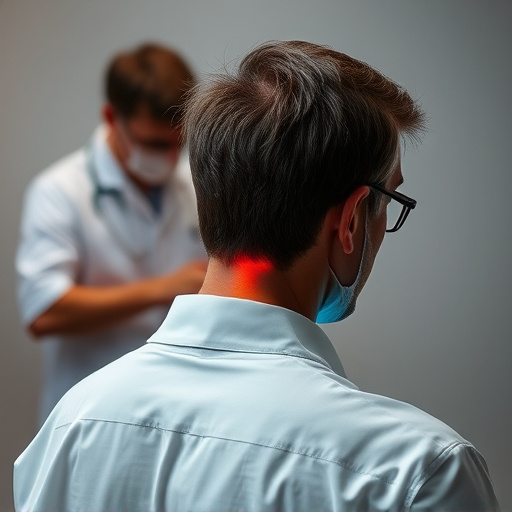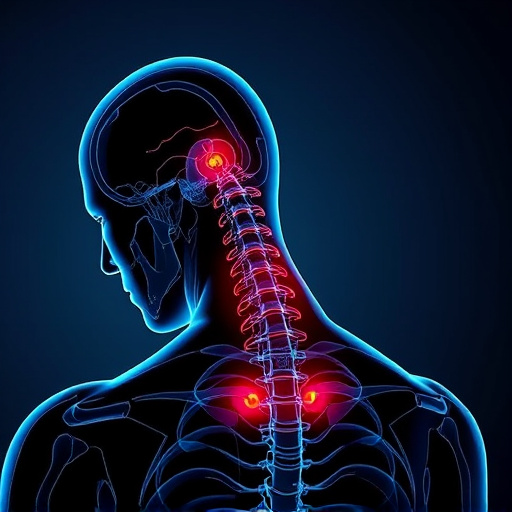Whiplash treatment specialists are crucial for managing collision injuries, from car accidents to sports mishaps, offering specialized care through physical therapy, pain management, and rehabilitation exercises. They diagnose and treat soft tissue damage, particularly in the spine and neck, with personalized plans to reduce inflammation, restore mobility, and improve overall quality of life. These experts use advanced techniques, comprehensive assessments, and patient education to guide recovery, prevent future injuries, and promote safety awareness among all road users.
Meet the medical professionals dedicated to healing unseen wounds: whiplash treatment specialists. These experts delve into the intricate world of collision injuries, focusing on the common types and causes behind whiplash, a prevalent issue in today’s bustling world. Understanding their role is crucial for effective management. From advanced techniques to patient assessment, this guide explores strategies for optimal recovery. Learn how these specialists prevent and address collision-related injuries, emphasizing safety awareness as a key component.
- Understanding Collision Injuries: Common Types and Causes
- The Role of a Whiplash Treatment Specialist
- Advanced Techniques for Whiplash Management
- Patient Assessment and Diagnosis Procedures
- Effective Rehabilitation Strategies for Optimal Recovery
- Preventing Collison-Related Injuries: Tips for Safety Awareness
Understanding Collision Injuries: Common Types and Causes

Collision injuries, often overlooked, can have profound impacts on individuals’ well-being. These injuries typically arise from vehicular accidents, sports mishaps, or sudden jolts, leading to a range of symptoms affecting the musculoskeletal system. Whiplash, for instance, is a common type of collision injury characterized by neck pain and stiffness resulting from rapid back-and-forth movements of the head. Other frequent types include soft tissue damage, spine injuries, and head traumas.
Causes vary widely, from car crashes at high speeds to sports collisions or even minor frictional forces. The severity of these injuries can range from mild discomfort to severe disabilities, underscoring the need for specialized care. A whiplash treatment specialist plays a crucial role in diagnosing and managing such conditions, focusing on techniques like physical therapy, pain management, and rehabilitation exercises tailored to each patient’s unique needs.
The Role of a Whiplash Treatment Specialist

A whiplash treatment specialist plays a crucial role in managing and mitigating the effects of whiplash injuries, which are common in traffic collisions. These specialists are medical professionals with advanced training in diagnosing and treating soft tissue damage, particularly the spine and neck. Whiplash, often resulting from sudden deceleration or acceleration during an accident, can cause significant pain and discomfort for victims.
The specialist’s expertise lies in developing tailored treatment plans to alleviate symptoms, reduce inflammation, and restore mobility. This may include a combination of manual therapy, physiotherapy, medication, and patient education. By focusing on early intervention and specialized care, these professionals help patients avoid long-term complications and expedite their recovery process, ensuring they return to their daily lives with minimal disruption.
Advanced Techniques for Whiplash Management

Whiplash, a common injury resulting from car accidents, requires specialized care. Medical professionals specializing in collision injuries play a pivotal role in managing whiplash effectively. These experts employ advanced techniques tailored to each patient’s unique condition. One such innovative approach involves targeted manual therapy, which helps alleviate pain and restore mobility by carefully manipulating the spine and affected areas.
Additionally, whiplash treatment specialists often incorporate specialized exercises and physical therapy into the rehabilitation process. These exercises are designed to strengthen the neck and back muscles, improve posture, and enhance overall flexibility. By combining these advanced techniques with a comprehensive understanding of collision injuries, these professionals offer patients a holistic and effective whiplash treatment plan, ensuring faster recovery and improved quality of life.
Patient Assessment and Diagnosis Procedures

Medical professionals specializing in collision injuries, often referred to as whiplash treatment specialists, employ a meticulous approach to patient assessment and diagnosis. The process typically begins with a comprehensive review of the patient’s medical history, including any pre-existing conditions or previous injuries that could contribute to their current symptoms. This step is vital for understanding the unique aspects of each case.
Following this, a detailed physical examination is conducted, focusing on the affected areas, such as the neck, back, and head. This examination may include specialized tests designed to assess the range of motion, identify muscle spasm or tenderness, and detect any neurological abnormalities. The use of advanced imaging techniques like X-rays, MRIs, or CT scans might also be incorporated to provide a clearer picture of internal structures and rule out potential fractures or other complexities. These procedures collectively aid in making accurate diagnoses, tailoring treatment plans accordingly for optimal patient outcomes.
Effective Rehabilitation Strategies for Optimal Recovery

In the realm of collision injuries, a whiplash treatment specialist plays a pivotal role in helping patients navigate their road to recovery. Effective rehabilitation strategies are crucial for optimal healing and restoring individuals’ mobility and quality of life. One key approach involves a multifaceted treatment plan that combines physical therapy, targeted exercises, and manual adjustments. Whiplash specialists tailor these interventions to address specific symptoms like muscle stiffness, joint pain, and nerve sensitivity.
Rehabilitation also emphasizes education and patient engagement. Specialists teach patients about the injury process, helping them understand their condition better. This knowledge empowers individuals to actively participate in their care, adhering to exercises and lifestyle modifications recommended during recovery. Additionally, incorporating cognitive-behavioral therapy can be beneficial, as it assists patients in managing pain, anxiety, and stress related to the traumatic event.
Preventing Collison-Related Injuries: Tips for Safety Awareness

Preventing collision-related injuries is a multifaceted approach that requires vigilance and education from all road users. A key player in this effort is the whiplash treatment specialist, who plays a crucial role in not just managing but also preventing such injuries. These professionals often provide valuable insights into safety awareness, emphasizing the importance of defensive driving techniques and regular vehicle maintenance.
Regular breaks during long drives, for instance, can help reduce the risk of fatigue-related accidents. Keeping vehicles well-maintained, including proper tire pressure and functioning brakes, is another vital tip from whiplash treatment specialists. Additionally, adhering to speed limits, maintaining a safe following distance, and being aware of blind spots are essential practices to avoid collisions.














